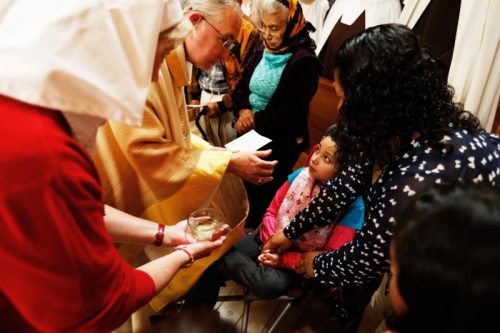Q. Recently I attended a service for the sick. The priest read a passage from the Gospel and then he distributed holy Communion before anointing the sick. Since it was a Saturday afternoon, I stayed in church afterwards and attended the Sunday vigil Mass.
I have two questions. First, would my presence at the service as described be considered as having attended Mass? And second, since I received Communion at the service for the sick, would I be permitted to receive again at the vigil Mass? (Riverside, California)
A. Many parishes — I would even say most — celebrate a communal anointing of the sick once or twice a year. This is consistent with the church’s desire, as expressed at the Second Vatican Council, that the sacrament not be reserved only for those who are at the point of death.

The council’s Constitution on the Sacred Liturgy (“Sacrosanctum Concilium”) states that “as soon as any one of the faithful begins to be in danger of death from sickness or old age, the fitting time for him to receive this sacrament has certainly already arrived” (No. 73).
I am a bit surprised, though, that the celebration you speak of included only a Communion service and not a Mass. In my experience, it is far more common for parishes to celebrate the communal anointing at a weekend Mass. If the priest you mentioned had waited until 4 p.m. on that Saturday afternoon, a Mass celebrated then would have fulfilled the Sunday obligation for those in attendance.
As to your questions: First, no, you did not satisfy that obligation simply by receiving Communion.
Catholics are required on Sundays and holy days of obligation to participate in the eucharistic sacrifice, during which the self-offering of Jesus is re-presented for our benefit; this means a full Mass, in which the bread and wine are offered with the appropriate prayers, transformed by the words of the priest into the body and blood of Christ and then received by the priest and those in attendance.

And yes, even though you received Communion at the anointing service, you would have been permitted to receive once more during the vigil Mass. A Catholic may receive Communion a second time during the same day, within the context of a Mass. Canon 917 of the church’s Code of Canon Law says, “A person who has already received the most holy Eucharist can receive it a second time on the same day only within the eucharistic celebration in which the person participates.”
Q. I can’t seem to find the answer to the following question: Is it acceptable for a Catholic to be buried in a national cemetery? (My inquiry is centered around the issue of consecrated ground.) Any guidance would be appreciated. (Flippin, Arkansas)
A. A Catholic may be buried wherever he or she chooses — in a Catholic cemetery, a non-Catholic or nonsectarian burial plot or, to your question, in a national cemetery where military veterans are honored. (My preference, of course, would be for a Catholic burial ground because the deceased would have the benefit of the Masses and prayers that are offered regularly for those buried there.)
The notion that a Catholic need always choose a Catholic cemetery may stem from a misreading of Canon 1180 in the church’s Code of Canon Law. The first paragraph of that canon states, “If a parish has its own cemetery, the deceased members of the faithful must be buried in it unless the deceased or those competent to take care of the burial of the deceased have chosen another cemetery legitimately.”
The word “must” was intended to place the burden on the parish, not on the deceased — that is to say, the parish is obligated to bury that parishioner if there is room and if that is the family’s choice. The following paragraph in this same canon makes the option even more clear: “Everyone, however, is permitted to choose the cemetery of burial unless prohibited by law.”
As regards “consecrated ground,” when a Catholic is interred in a non-Catholic plot, the priest who officiates at the committal says a prayer that blesses that gravesite.
Questions may be sent to Father Kenneth Doyle at askfatherdoyle@gmail.com and 30 Columbia Circle Dr. Albany, New York 12203.






















